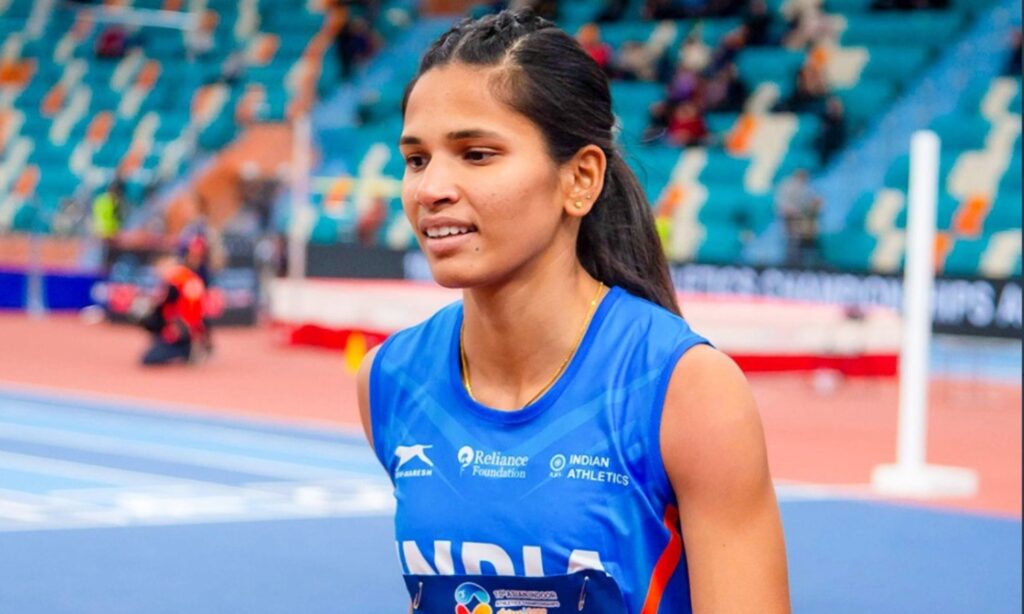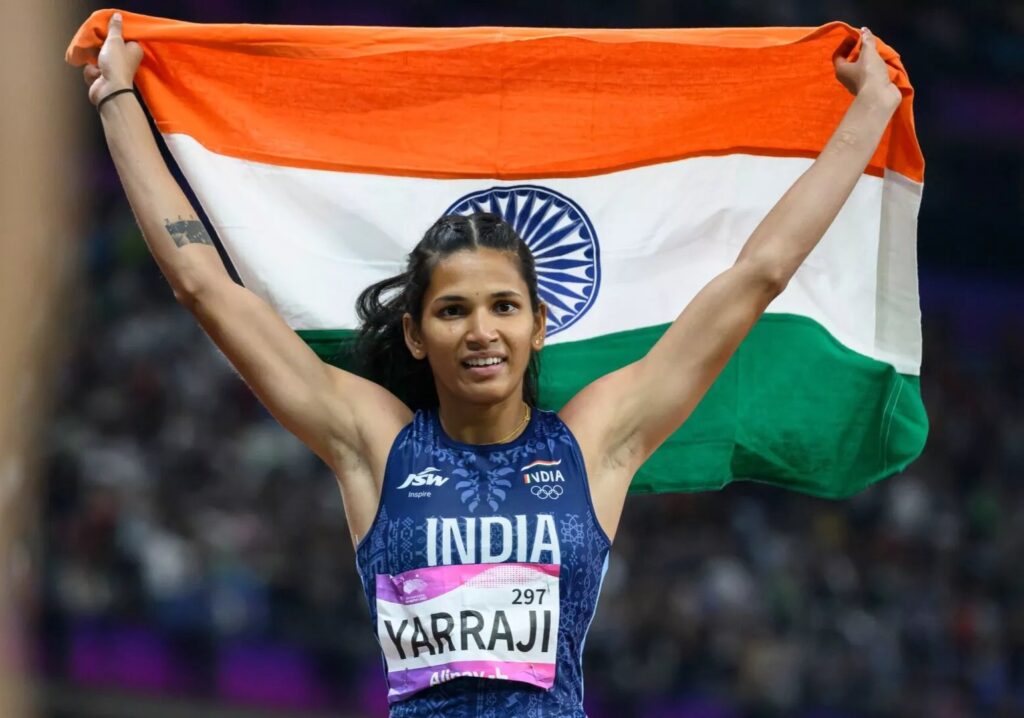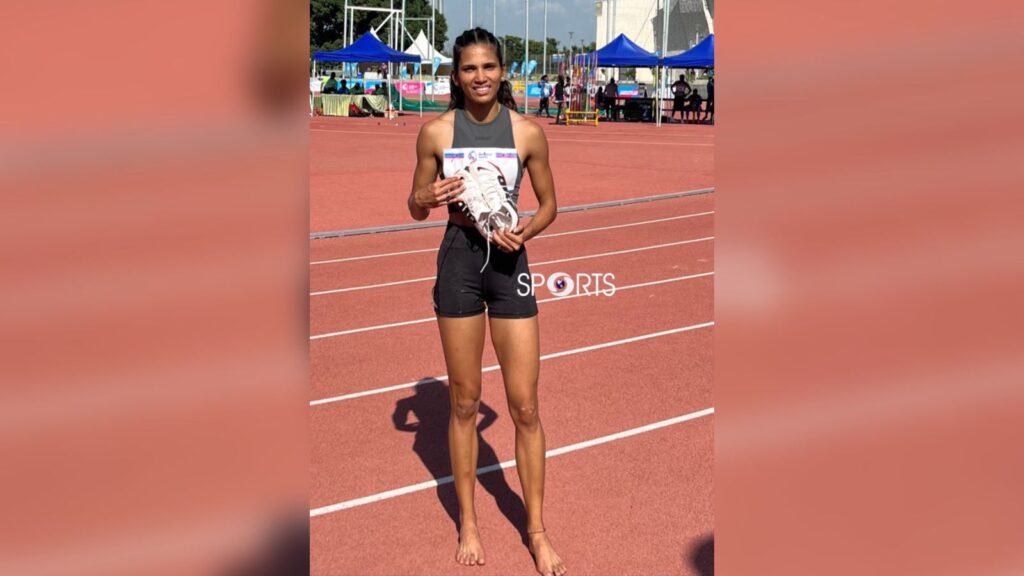
After interviewing the champion 100m hurdler, Jyothi Yarraji, you end up having a wish – In an imaginary sense, if one could wear her shoes just to gauge what might be going through her mind while trailing in a race. The simple reason for such a thought flashing in the chambers of the brain was because of Jyothi’s trait of coming from behind to win medals. Recently, too, she showcased her gifts in the final of the Asian Athletics Championships in Gumi.
After five hurdles out of 10, she was trailing Japan’s Yumi Tanaka and China’s Wu Yanni. However, after crossing the sixth hurdle, she ramped up her pace. Eventually, she beat both of them, raised her arms in delight, and let out a roar. She had just defended her title with aplomb. Behind the scenes, though, there is another story that needs to be told. Her deep reservoir of willpower to overcome the uncontrollables. With thunderstorms around in Gumi, she had to find a place to practice. Soon, she found one, and it turned out to be a storage room.
“The race was at 6 o’clock, but it got postponed due to heavy rains before that day,” she said to RevSportz. “It got postponed by two hours. (On the race day), we had done warm-ups and everything. But one hour before, the rains were heavy, so I was not able to do training. It got postponed by two hours once again… to 10.25 PM (local time). I always try to push myself in a positive way. The rain is for everyone, it is not only for me, eight (of them) are running in that rain. So, I tried to make myself strong in that situation. Whatever the atmosphere on that day, I had to make it favourable (for myself).
“I went to a small storeroom and did some activities. So that I don’t allow my body to cool down, to keep my body warm and keep it moving. So, I tried to be smart. My coach (James Hillier) also helped me, how I have to move forward with the situation. I appreciate my coach. We don’t have a track (inside the room), so we can’t do the long hurdles stuff. We have only a 10-meter room. In that, I did band activation. I wore uppers and track pants that will keep my body warm. And I did two-three hurdles, very short. But I kept moving my lead leg and trial leg, so as to make sure it is active. We worked on a few technical things.”
While scrolling through the above-mentioned paragraphs, one can get a gist of how the skill is harnessed and goals are pursued in unseen factories, better known as training workshops. After all, even a microscopic mistake could lead to an athlete crashing into any of the hurdles which are 33 inches in height. Jyothi, in her endeavour to improve by fractions and percentages, looked to tweak her approach before the 2024 Paris Olympics. Although, after a while, she had to fall back on her old template.
“In India, nobody had raced under 13 seconds because we didn’t know how others were doing,” she said. “We see with Americans and Europeans, a lot of them are doing below 13 seconds. So, we have to challenge ourselves, doing things that make you feel that you are faster and stronger. I have tried seven strides [before the first hurdle], a few of the athletes have done it at the global level. I had an injury – hip-flexor – not because of it, but due to some technical problem. I don’t know why exactly it happened. Unfortunately, I couldn’t do seven strides continuously, so I moved back to eight strides.”
The discussion soon veered towards the qualifying mark for the forthcoming World Championships in 100m hurdles, which stands at 12.73 seconds. Jyothi, who has been in very good form, having won in South Korea and Taiwan in rather difficult conditions, would believe that the mark is within her reach. Her personal best is currently 12.78 seconds. On a slightly pessimistic note, she was laid low by a hamstring injury earlier in the year. But now, she is geared up and ready to conquer new heights.
“Actually, I am going through a good season,” she observed. “I got injured two times, I couldn’t do my training. I have a few months until the World Championships. Before that, I do believe that I can qualify. Next month, we are moving to Germany, Greece… I am having four competitions. I am not sure which date we are leaving. But we are planning to move with our whole team. Not only me, new girls are coming. The hurdlers team is coming, the sprinters team is coming. It will be great to go together, have fun over there, have some good races, get some PBs.”

Jyothi also elaborated on how the field of athletics is on an upward curve in India. “I am doing under 13 seconds six to seven times,” she noted. “This year also, I have done under 13 seconds two times. It is not easy, it is very intense. A small mistake can lead to a difference between 13 and 12 seconds. They have a lot of experience like, say, 15-20 years. They have been running since they were 7-8 years old. So, it is not easy to cut it in one or two years. I appreciate how Indians are coming though.
“Two-three years back, 13.7 seconds was a big deal in India. Now you have to run 13.1 seconds to get second place in nationals. I am not giving it easily for them to win medals. I want the competition because if they are running fast, I get motivation to run faster. We need a lot of experience, we need time, everything matters. For me to go from 12.7 seconds to 12.5 seconds, I need time to get better and better. We need patience.”
For Jyothi, to find the best version of herself, she needs rhythm, balance and explosiveness. In order to refine and polish her skills, Jyothi has been training abroad in places like Tenerife, Spain. “The upcoming athletes need international exposure because if you go and see how the girls are running faster – 12.9 to 12.1 seconds – the technical work, the power work, how are they doing, that will help us to understand. It is a lot easier to understand how hard we have to work to reach that level. I am really happy to meet new friends – Europeans and Americans and all the global-stage girls.
“They are really good and they are really mature. A few girls really helped me a lot. They are really excited to train with me. I think every Indian athlete needs opportunities to get this type of competition and exposure. So that they will also understand how tough it is. In India, we have less competitions. A few athletes are power-based athletes. And a few athletes are rhythmic athletes, a few are speed athletes. So, we have to find out which type of pattern is working for you. And you have to train with them. Hurdles is a combination of speed and technical aspects.
“Mindset is the key here. You can’t panic. If you see Nadine [Visser], Sarah [Lavin], Tia [Jones]… they are continuously competing in the Diamond Leagues, World Championships and Olympics. If you see, I am participating with Nithya [Ramraj], Moumita [Mondal], Pragyan [Sahu], these girls… I am comfortable with them. I know that they are clocking certain timings, we understand each other. The same thing happens in Europe, but the level of competition is completely different. They are clocking 12.5, 12.3, 12.2 seconds…when we get the exposure, we can improve. That is why we go to Europe to understand the level of intensity.”
At this point of the interview, one might again ponder whether Jyothi has the required mental strength to break many more barriers. Just a mere glance at some of her gritty performances in the recent past would give the readers the assurance that she makes the improbable seem possible. In her first international meet – Cyprus – she broke the women’s 100m hurdles national record with a timing of 13.23 seconds, surpassing the previous mark of 13.38 seconds held by Anuradha Biswal.
What made that victory even more impressive was that she was trailing and had the slowest reaction time off the blocks. The reason behind it was in India, officials tended to use the manual gun. Here, it was different – Electronic Starter. “I didn’t have the experience of it,” said Jyothi. “I think I have good speed and endurance; the pulling power. I see that girl in front of me, it is a good challenge to cross that girl. I have a target in front of me. If somebody is there for me to target, I always chase her.”
Jyothi’s resolve to succeed could also be noticed during her silver-medal effort at the Asian Games a couple of years ago. Initially, the officials had called her out for a false-flag violation. However, replays indicated that Wu Yanni was at fault. She was the one who had made the false start and Jyothi just followed her. Later, she was allowed to race, and Jyothi went on to win the bronze. It was subsequently upgraded to silver after Yanni was disqualified. In all of this, Jyothi had stood her ground by making valid points while putting her case forward with the officials.

“We Indians have a strong mindset,” she said. “If you see other athletes, they don’t fight that much. If we get that opportunity, we fight for our rights. My mother always taught me to fight for what we need because I come from a poor background. Before that Asian Games, no one from India had won a medal in the 100 m (women’s) hurdles in the Asian Games. So, it is a historical moment for me and my country. I am pretty sure I didn’t make a mistake, I felt that the other girl started first, then I moved. If I make a mistake, then I am 100 percent out of the race. So, I stood for myself, thank God it helped.”
Jyothi comes from a humble background. Her father, Suryanarayana, was employed as a private security guard while her mother, Kumari, was a domestic help. She was also employed part-time as a cleaner in a hospital. However, Jyothi’s Physical Education Teacher at Vizag’s Port High School – Srinivas Reddy – felt she had the potential to make an impact in the world of Track and Field. A career for Jyothi was about to blossom. “The Physical Education teacher, he wants to bring in new athletes,” she said. “In 2015, the situation was bad. At that time, he took the stand, always encouraged me.”
She then came under the tutelage of Ramesh, another athletics coach. Here, too, Jyothi had to wade through her share of ups and downs. “What he did was perfect for me because every athlete should try other events as well – high jump, long jump, 100 m hurdles – then only you will know what event is good for you,” said Jyothi. “For me, when I did hurdles, I hit hurdles many times, I fell down, but I never wanted to step back. I am always interested to learn more. I am always interested in crossing the hurdles.”
Jyothi thanked all her coaches – including James Hillier and Ramesh, and the Reliance Foundation. But at the same time, she hoped that there would be a better sports culture in Vizag, her hometown. Who knows there could be many more Jyothi Yarrajis waiting in the wings in Vizag.
“In my city, there is no sports culture,” said Jyothi ruefully. “And we still don’t have a sports ground. We don’t have any kind of academies. If I go home, I don’t know how to train. I feel a few of the girls are more talented than even me in Vizag. They are really capable of winning Olympic medals, winning Asian Games medals. But because of lack of exposure, they are not coming up.”
Follow Revsportz for latest sports news



